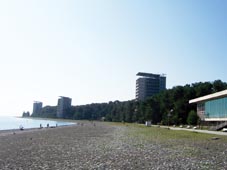Tourism in a hotspot: Abkhazia looks to foreign money for security
By Temuri Kiguradze
Friday, July 4

The situation has changed dramatically since the collapse of Soviet Union and the separatist war which followed in 1992–93.
“The tourism infrastructure of Abkhazia was almost completely destroyed during the war,” says separatist deputy foreign minister Maxim Gvinjia.
While small seaside towns with their beaches and sanatoriums were the stage for pitched battle in the conflict, Gvinjia paints a rosy picture of the situation now.
He claims business is booming with more than two million tourists visiting Abkhazia in 2007.
If accurate, this is nearly six times the official number of tourists that visited Adjara, currently Georgia’s most vaunted tourist destination, the same year.
“Tourism is one of the most important spheres of our economy and we are trying our best to restore it,” the de facto official says.
There’s no surprise where he says these holidaymakers are flocking from: “Of course the absolute majority of them are Russians.”
Elizaveta Starkova, a travel reviewer for the popular Russian tourism website Coolrest.ru says Abkhazia is becoming a more attractive destination for Russian tourists every year, but that it is yet to regain the popularity of its Soviet heyday.
“The older generation still remembers the old fame of Abkhaz resorts and the youth like the low prices compared to the Russian seaside,” Starkova says.
Despite the region’s natural beauty the ravages of the conflict are still plain to the eye, says 35-year-old Darya, a Russian who holidayed in Sokhumi last year.
“Generally a trip to Abkhazia is like traveling on a time machine to the Soviet Union in the 70s or 80s. The service is as bad as it was at that time. Of course it’s really cheap to go but in these conditions a holiday should be free of charge,” she says.
Starkova, of the Russian tourism website, says investments in repairing and building new hotels and sanatoriums, as well as training courses for the service staff could improve the situation in Abkhazia.
“However investors don’t rush to put money in this region; despite the low prices on land and favorable laws for them, they are still afraid of the undefined status of this territory,” she says.
Such concern is justified. In April, Georgian State Minister for Reintegration Issues Temur Iakobashvili said Tbilisi would redouble efforts to prosecute Russian companies doing business in the breakaway regions.
“In order to stop economic annexation [of Abkhazia], we are forced to put all offending companies and their owners and top managers on a wanted list [for Interpol],” Iakobashvili told the newspaper Rezonansi.
It is not only the non-resolved status issue that has the potential to put off tourists. De facto Abkhaz officials say that the recent explosions in Sokhumi are part of an attempt by Tbilisi to scupper a successful summer season there. Georgia denies the accusation.
Explosions hit the Abkhazian towns of Gagra and Sokhumi a day apart, on June 29 and 30, reportedly injuring more than a dozen people.
The Russian media initially reported that Russian tourists were among the injured, something Moscow later denied.
Russian tour operators have posted notices on their websites informing customers of the explosions and have acknowledged that some are opting to cancel their bookings.
“I don’t understand why Georgia tries to stop the economic development of Abkhazia with this kind of provocation,” Gvinjia said.
One answer is given by the separatists’ military chief, Anatoly Zaitsev, speaking to the Russian online publication Expert.ru: he says Russian investments, in tourism and other industries, flowing southwards into the Abkhazian economy will ultimately sink Georgia’s hopes to regain the breakaway territory.
“Big business is coming [to Abkhazia] and when big business comes it is protected by all forces,” Zaitsev said. “Business is a guarantor of security in Abkhazia.”
